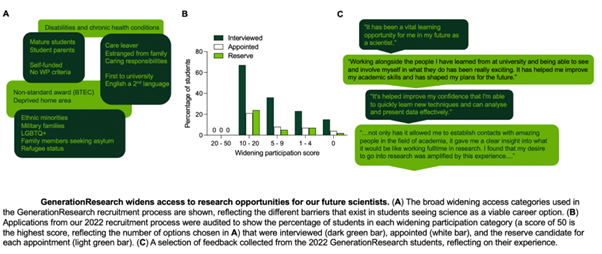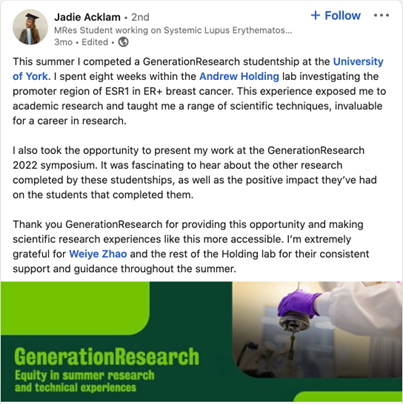


Context
The Department of Biology at University of York had many years’ experience in attracting and managing summer students. However, the funding, application, recruitment, and management process was reimagined in 2020. The aim was to encourage external partnerships for better funding and higher quality experiences, offering both ‘research’ and ‘technical’ experiences. In addition, we wanted to increase transparency and visibility to ensure equity to all student groups, involving STEM students at university in the Yorkshire region.
Summer studentships offer an exciting chance for undergraduates to experience research. Access to these programmes is important for continuing in higher education (research masters and PhD programmes), graduate research/technician post applications, the graduate industrial/ pharmaceutical job market, and health and medicine. It also offers the student the chance to perform authentic and important research, which often leads to the generation of new ideas and data for the host research lab. Often the route to achieving a studentship favours confident and outgoing students, but is incompatible for students with ‘low social capital’, or students with protected characteristics, thus resulting in these students finding further education and roles in the science industry harder to access.
GenerationResearch was created in 2021 and works to recruit talented undergraduate and masters’ students to provide valuable research experiences via a platform that embeds equity and inclusivity in order to change research environment and drive sustainable diversity in science.
Action & approach
We have implemented a number of changes:
- Attracted external funding from a range of stakeholders and partners, including Zeiss microscopes, BBSRC/White Rose DTP, and Gilead Sciences · Launched www.generationresearch.ac.uk to house all our studentship projects, including the application process.
- Designed a transparent and fairer application and recruitment process to incorporate widening participation criteria.
Projects are selected from PIs, post-docs, and experienced technical and research assistant staff. Applications are made via a Google-based form that collects widening participation criteria (tick boxes for 18 different options, home post code for deprivation score, and student funding), plus student answers to three questions:
- Describe and give detail on an area of science that particularly interests you and explain why it is important (apprx. 300 words)
- What do you hope to gain from this studentship experience? (apprx. 300 words)
- What skills and experience do you have that are relevant for this studentship? (apprx. 300 words)
Students are ranked for interview based 50:50 on widening participation score (one point for each positive score) and the quality of their answers to the above questions. Interviews are on Zoom, 20 mins only, and consist of a pre-prepared 5-minute presentation by the interviewee and 3 panel questions asked to all students. The final offer is the decision of the project supervisor, however the interview panel also includes a GenRes team member.
Impact
Since 2021 we have provided over 60 summer studentship, 4 fully funded Masters by Research, and one industrial placement opportunity. By working across disciplines (Biology, Chemistry, Physics, Electronic Engineering, and medicine), and through a collaboration with external partners (BBSRC, Universities of Leeds and Sheffield, MRC-LMB, and industrial partners) we offer students at White Rose universities greater visibility in research practices at different institutions. The scheme attracted 360 applications in 2023 from students across a diverse range of the student body and across the White Rose area (York, Leeds, Sheffield, Bradford, Hull). We invite stakeholders to contribute to a celebratory symposium at the end of the studentship period where students have the chance to present their findings and successes. We also invite students and stakeholders to join a GenerationResearch LinkedIn community so that we can continue to follow the success of our students in their future endeavors.

Conclusions & advice
It is important to acknowledge that GenerationResearch is not a perfect scheme. We spend a lot of time in our team thinking about being aspirational in order to make this important scheme bigger and better. Our focus for 2024 will be to continue to generate funding from partners and stakeholders. Without this we cannot provide opportunity to students. In addition, we would like to encourage participation from more Yorkshire Universities, both as hosts of research and technical projects and in applications from there students. Indeed, we have already had positive discussions with Leeds Beckett University. In the future we would like to see not only more funded summer studentship and Masters by Research opportunities, but also GenerationResearch PhD studentships, graduate technical apprenticeship positions, and think about how the application process we have developed could be used for other academic positions.













